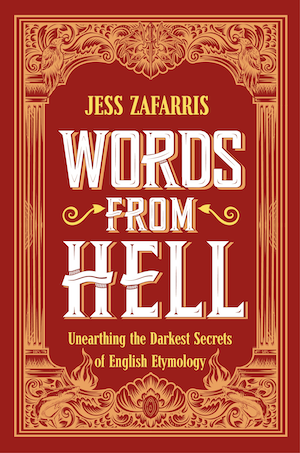In my forthcoming book Words from Hell (Chambers 2023), I spend a hefty chapter exploring the origins of all things erotic and naughty. The following excerpt from the book explores some entertaining and enticing terms that you may not have previously encountered—and even if you have, you may enjoy learning about their titillating origins.
Bathukolpian (also spelled bathykulpian or bathycolpian)
This word describes full, luscious breasts. It literally means “deep-bosomed” and is composed of the Greek elements bathys “deep” and kolpos “breast.”
Callipygian
This Greek-derived word means “having beautiful buttocks” (kallos “beauty” + pygē “rump, buttocks”) and was originally used to describe a particularly juicy-assed statue of a woman usually identified as Aphrodite, which is commonly known as the Callipygian Venus.
The statue shows her lifting up her garment, called a peplos, revealing her shapely posterior. It’s thought to be a marble copy of an earlier bronze, and the marble version was discovered without its head. Her head was restored in the 16th century, and the restorer took the liberty of positioning it so that she too is more obviously examining her lovely bum.
Concupiscence
This word for lustfulness is from the Latin concupiscere, “to desire eagerly,” with the root cupere meaning “to long for.” It shares this root with the name of the Roman god Cupid.
Ithyphallic
This is a word for a type of meter used in ancient Greek poetry, and it is named after the Greek ithyphallos, a large model phallus carried around during the festivals of Bacchus. It literally refers to a penis that is pointing straight upward.
The poetic meter is named after the peen because it was the meter used in Bacchic hymns sung while hauling around the big dong. In Victorian English, this adjective, ithyphallic, was also often used to describe things and behaviors that were grossly vulgar and indecent.
Muliebrity
A synonym for “femininity” or “womanhood,” this word arose in English as a female equivalent of “virility” in men in the late 1500s. It is from the Latin mulier, meaning “woman”—but in a borderline misogynistic way because it’s thought to be related to mollis, meaning “soft” or “weak.”
Variations on this word in English history include muliebral, meaning “womanly” or “pertaining to a woman,” mulibrious, meaning “effeminate,” and mulierosity, meaning “overfondness for women.”
Rantallion
This word, recorded in the 1785 A Classical Dictionary of the Vulgar Tongue by lexicographer Francis Grose, is said to mean “one whose scrotum is so relaxed as to be longer than his penis,” or, in Grose’s words, someone “whose shot pouch is longer than the barrel of his piece.”
The origin of this word is unknown because most recorded references to it simply direct back to Grose’s somewhat creative dictionary, but there are other, similar words recorded earlier, including rantipole, which typically meant a “rude, wild person,” especially a child, or in the case of the phrase “to ride rantipole,” it referred to the woman-on-top or “cowgirl” sex position.
It could be that the uniting factor in all these words is the verb “rant,” which now has a negative connotation—suggesting loud, angry and irrational speech—but was originally a positive word, meaning “to be jovial and boisterous.” (Hence, rantallion would imply “big-dick energy” but more focused on the balls, and rantipole would imply people having a good loud time.) The “rant” relation would also connect it to the word “randy,” which is a variation on the pleasantly loud and jovial sense of “rant” as well.
Read more in Words from Hell.


